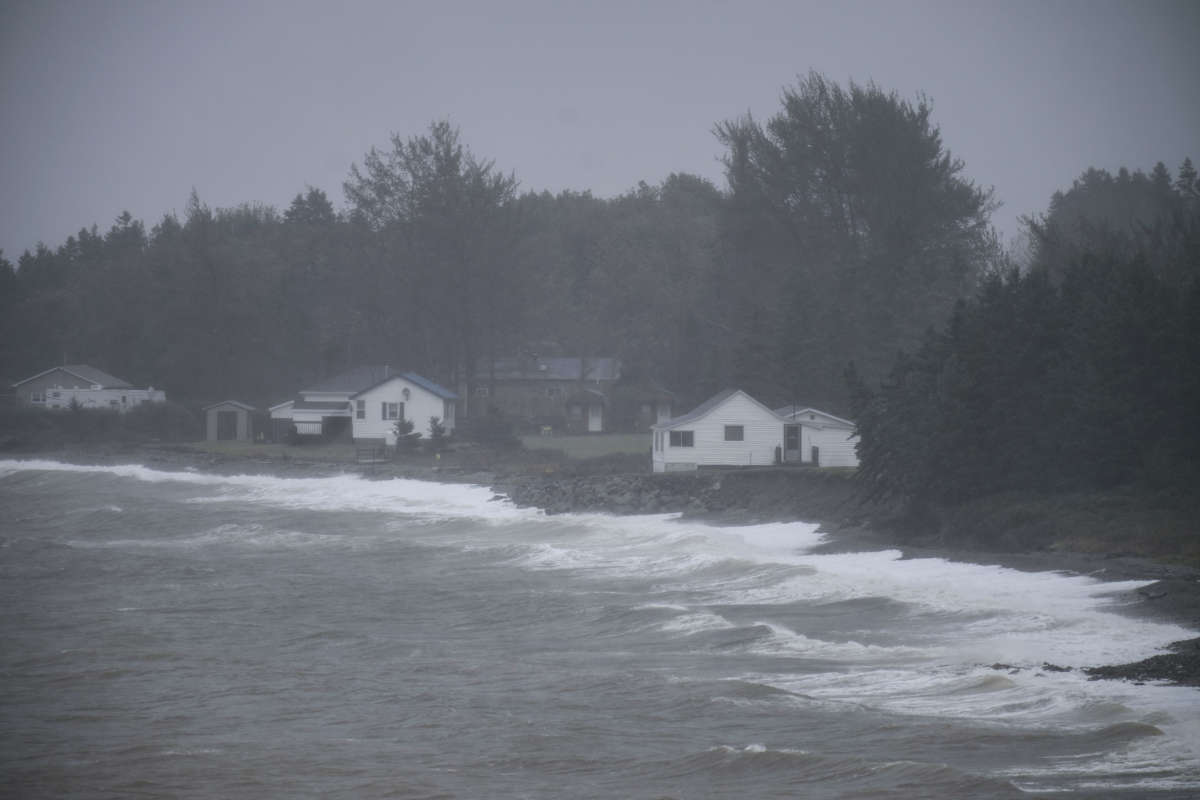At least eight homes were reportedly swept into the sea in southern Newfoundland Saturday after post-Tropical Storm Fiona slammed into eastern Canada with winds racing at nearly 81 miles per hour and the lowest barometric pressure ever recorded for a storm in the country.
After knocking out power in Puerto Rico last week when it hit the U.S. territory as a Category 1 hurricane and intensifying to a Category 4 storm as it approached Bermuda, Fiona made landfall in Nova Scotia, where it caused “very extensive damage” at an airport in Sydney and cut off power for more than 415,000 of the province’s 500,000 customers.
On Sunday, more than 265,000 households in Nova Scotia were still without power, and the province’s electricity company warned the outages would persist “for multiple days.”
Fiona has been blamed for at least five deaths in the Caribbean; in Port aux Basques, Newfoundland, one woman has been listed as missing after her home was “struck by a devastating wave,” and authorities were investigating whether “she went out with the water,” Royal Canadian Mounted Police spokesperson Jolene Garland told The Washington Post late Saturday.
Another woman in the area was being treated for injuries after being rescued.
Port aux Basques was also where a number of structures were seen floating out to sea as the storm battered the town.
Post-Tropical Cyclone Fiona, which was downgraded from a Category 3 hurricane, overwhelmed coastal towns in eastern Canada — flooding roadways, knocking out power and destroying buildings. https://t.co/c7JoHoFNh0 pic.twitter.com/wlM6iIPy9j
— The New York Times (@nytimes) September 24, 2022
“I’m seeing homes in the ocean,” René J. Roy, a resident of the town and editor of the local news outlet Wreckhouse Press, told the Associated Press. “I’m seeing rubble floating all over the place. It’s complete and utter destruction… It’s quite terrifying.”
Residents posted videos of the destruction on social media.
Rescue workers in Port aux Basques were also battling electrical fires after the storm subsided.
In Halifax, Nova Scotia, Mayor Mike Savage said the roof of an apartment building had collapsed and officials had evacuated 100 people to an emergency center.
The historically low-pressure storm — the kind associated with strong winds and heavy rainfall — offered the latest sign that the human-caused climate emergency is fueling extreme weather, said 350.org co-founder and author Bill McKibben.
Fiona smashed into Canada with by far the lowest barometric pressure ever recorded in the nation.
This is not the same earth we were born onto https://t.co/EuyhbqLYrJ— Bill McKibben (@billmckibben) September 24, 2022
At The Conversation, civil engineering professor Ryan P. Mulligan of Queen’s University in Ontario noted that the storm caused waves to reach more than 32 feet high on the Scotian Shelf off Nova Scotia, adding that “hurricanes with the size and strength of Fiona do not usually maintain their high wind speeds this far north.”
“How did Fiona get into Canadian water with such size and intensity? This is related to its heat source: the ocean,” wrote Mulligan. “Ocean warming may be linked to the increasing intensity of storms making landfall and to the development of strong hurricanes.”
“So climate change leads to warmer ocean water at higher latitudes,” he added. “A warmer future increases the probability that more intense storms will reach Canadian coasts.”
As climate scientists have warned, stronger hurricanes and tropical storms “what we continue seeing as a result of decades of climate damage,” said former Ohio state Sen. Nina Turner.
Trump is silencing political dissent. We appeal for your support.
Progressive nonprofits are the latest target caught in Trump’s crosshairs. With the aim of eliminating political opposition, Trump and his sycophants are working to curb government funding, constrain private foundations, and even cut tax-exempt status from organizations he dislikes.
We’re concerned, because Truthout is not immune to such bad-faith attacks.
We can only resist Trump’s attacks by cultivating a strong base of support. The right-wing mediasphere is funded comfortably by billionaire owners and venture capitalist philanthropists. At Truthout, we have you.
Our fundraising campaign is over, but we fell a bit short and still need your help. Please take a meaningful action in the fight against authoritarianism: make a one-time or monthly donation to Truthout. If you have the means, please dig deep.
